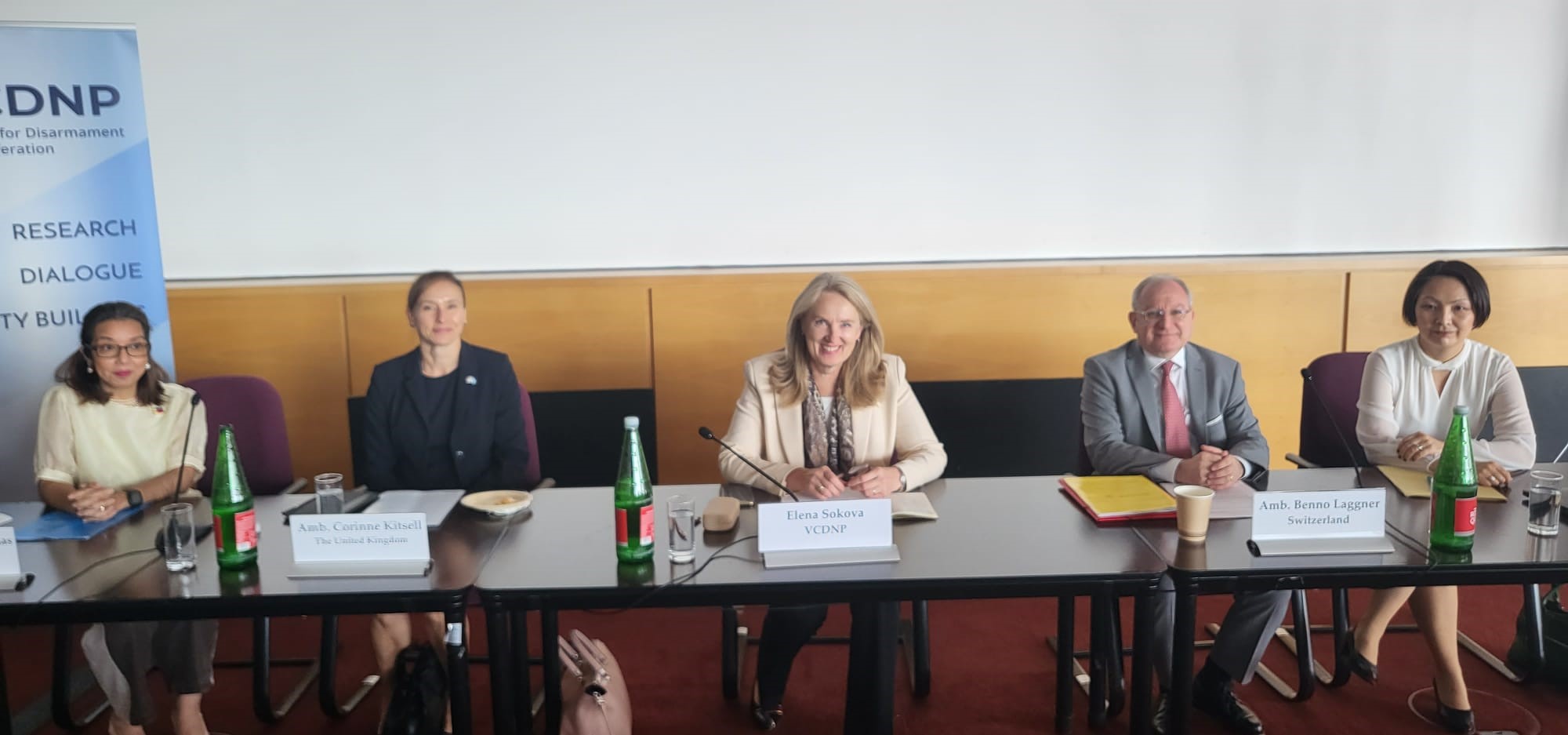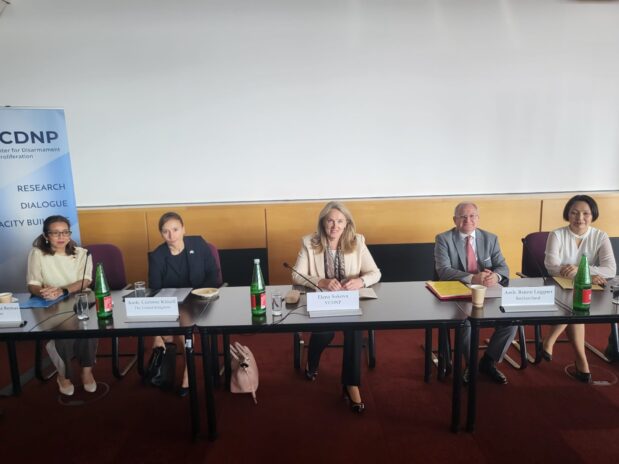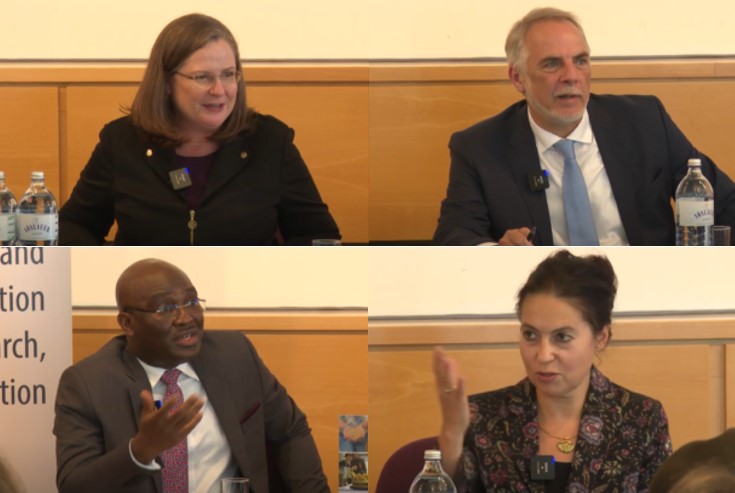
Following the first Preparatory Committee meeting of the 11th Review Conference to the Treaty on the Non-Proliferation of Nuclear Weapons (NPT) and the Working Group on further strengthening the NPT review process, the VCDNP hosted a panel discussion to discuss the lessons learned and the possible paths forward. The speakers noted the constructive discussions at the Working Group and willingness of many States Parties to take forward some of the proposals on strengthening the review process, despite the Group’s failure to adopt recommendations by consensus.
Held on 3 October 2023 at the Permanent Mission of Japan to the International Organizations in Vienna, the event featured Vienna-based ambassadors and experts who participated in the Working Group and Preparatory Committee deliberations:
VCDNP Executive Director Elena K. Sokova moderated the discussion.

Transparency and Accountability
Reviewing the debates at the Working Group, the panellists remarked on the broad convergence of views among State Parties on ways to improve the review process and highlighted the discussion on enhancing transparency and accountability. Ambassador Laggner said the latter issue was key for many States Parties, and Ambassador Bernas underscored that accountability on nuclear disarmament was particularly important for the non-aligned countries.
The Working Group demonstrated common interest among non-nuclear-weapon States in regular, standardized reporting by the nuclear-weapon States (NWS) on the implementation of disarmament commitments and a mechanism for interactive discussion of such reports as part of the review process meetings. Although no recommendations came out of the Working Group, some of the speakers argued States Parties could still implement these proposals. The NWS could voluntarily submit standardized reports and present them for discussion at the future PrepCom meetings and review conferences, even without a formal agenda item.
Ms. Sokova, Ambassador Laggner and others also noted that it was regrettable and illogical that the Working Group that discussed, among other matters, enhancing transparency of the review process, deliberated behind closed doors and excluded civil society.
Echoes from the Review Conference
As the first Preparatory Committee meeting convened barely a year after the Tenth Review Conference, speakers noted that discussions at the PrepCom in many ways continued or repeated the debates of the Review Conference. Ambassador Kitsell observed that there was “a lot of looking backward to New York rather than looking forward.” The impact of Russia’s war against Ukraine, nuclear risk reduction, non-proliferation implications of the AUKUS partnership, and deployment of nuclear weapons on the territory of non-nuclear-weapon States were among the issues that continued to be prominent in the discussions.
Ambassador Laggner highlighted the continuing nuclear modernisation programmes, increased salience of nuclear weapons in defence policies and doctrines, and nuclear threats, which make implementation of disarmament commitments and increased transparency by the NWS key priorities for this review cycle. Ambassador Kitsell noted that the NWS consultations, known as the P5 process, were still severely complicated by the confrontation between Russia and Western countries over the invasion of Ukraine. In this regard, Ms. Mukhatzhanova questioned the possibility of making progress and achieving a consensus outcome during the 11th review cycle in the absence of direct engagement between some of the key actors, including the United States and Russia.
Debating Consensus in the NPT
The speakers observed that while disappointing, the lack of agreement on the factual summary of the first PrepCom meeting was not surprising, given that the States Parties had not adopted one since 2002. However, as Ms. Sokova noted at the start of the seminar, for the first time, the PrepCom Chair was blocked from submitting his factual summary as a working paper by one state. Ambassador Laggner described it as a case of censorship, which resulted in the disappearance of the draft summary from the official records of the meeting. He argued that states should respect the chairs’ traditional prerogative to submit documents under their own authority.
Addressing the question of how States Parties can avoid such situations in the future, the panellists debated the merits and feasibility of departing from the established NPT practice of adopting everything by consensus. Ambassador Laggner pointed out that the rules of procedure do allow for decisions to be made by a vote but warned that this approach risks “opening a pandora’s box.” Ambassador Kitsell also expressed concern about how abandoning the consensus approach could affect the ability of the NPT States Parties to take decisions in the future.
Describing the roles and interactions of nuclear- and non-nuclear-weapon States in the NPT, Ambassador Bernas invoked a famous proverb, “When elephants fight, it is the grass that suffers.” She said that the slow pace of progress on nuclear disarmament notwithstanding, the non-nuclear-weapon States would continue to participate in NPT deliberations as actively as they could. It is important, she said, “to make sure the grass survives.”
The VCDNP is grateful to the Austrian Foreign Ministry for its generous support of this seminar series.
The VCDNP extends its thanks to the Permanent Mission of Japan to the International Organizations in Vienna for providing its conference room for this event.



